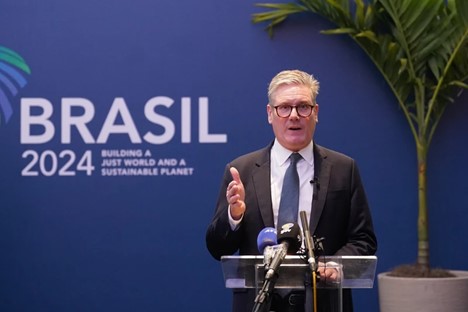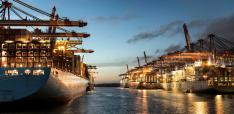Love Island in Suits: Why does Britain’s insular media attend global summits?

The G20 Team are baffled by the UK media’s approach to reporting important international policy agendas.
Donald Trump’s victory in the 2024 US presidential election should represent the final nail in the coffin of the swashbuckling globalist fantasies that drove the country’s hard Brexit from the European Union (EU).
As the horrendous economic damage caused by this fateful decision continues to accumulate, policymakers in London find themselves stuck in an invidious position adrift in the mid-Atlantic. Unmoored from the EU’s single market, the country enjoys neither shelter from the whirlwind about to be unleashed by the most protectionist President in living memory nor the ease of access to its largest market that could offset it.

Some have presented this as Britain’s time to choose. But there is no choice to be made between an asymmetric free trade agreement (FTA) with a distant partner that would decimate sensitive sectors, and the kind of deep integration with a proximate one on which the modern UK economy was built and out of which it has been traumatically torn since 2020. Besides, the former, despite the delusions of Britain’s own Trumpists, is unlikely to ever be on offer; rebuilding the latter seems to be a generational project that offers little solace in the here and now.
In fact, the UK appears increasingly economically isolated. Not only does Trump’s re-election put to bed the fantasy that a hard Brexit predicated on a 20th Century FTA with Europe – a genuine regulatory superpower on the doorstep – can sustain a highly integrated 21st Century economy, it also fatally undermines the idea of a special relationship that can easily extract countervailing benefits.
Despite their chronic triumphalism, the country’s political and journalistic elites have long been dangerously complacent about these geopolitical and geoeconomic realities.
Few even seem to grasp the difference between a thin FTA (which is what we have now) and membership of a genuine single market (which is what we had before), and therefore the implications and difficulty of (not) swapping the one for the other. Many still inhabit an unreconstructed 19th Century world where Britannia still rules the waves, far overstating the power of a small northern European country to remake the world around it alone.
Yet the urgency of the challenge – an impossible-to-stem ongoing bleed of 4 per cent of GDP (£100bn) annually, implying a £40bn tax gap – cannot be ignored indefinitely. Growth is the only way out of this situation, but it is this situation which is reinforcing a low growth trajectory. So, Britain is not only adrift, but stagnant, suspended in stasis.
Why does this matter, when viewed from the vantage point of the G20 International Media Centre (IMC)?
Part of the explanation for this dispiriting state of affairs is our distinctly introverted political debate. Just as Brexit was an insular vision that had – and still has – little to say about Europe’s future, the travelling pack of lobby journalists that follow Prime Ministers around the world remain obsessed with domestic trivia and court gossip that pales in significance against the weight of the global issues under discussion at summits like these.
Exhibit A: at COP29 in Baku, Azerbaijan, just a few days before the G20 began – in a year the totemic threshold of 1.5C will be breached and delegates were debating no less than $1.5 trillion in climate finance – Keir Starmer was assailed by questions about an assisting dying bill that has not even been laid before parliament. Exhibit B: as she flew to Rio aboard the Prime Minister’s jet, Sky News journalist, Beth Rigby, tweeted that there is lots on the G20 agenda: ‘an attempt by Western allies to try to Trump proof Ukraine’ and questions for Starmer to answer on ‘small boats’, ‘the assisted dying bill’ and ‘the farmers revolt’.
In fact, none of these things are on the actual G20 agenda. As we speak to journalists from China, the Middle East, Latin America and elsewhere in Europe in the IMC, these parochial concerns are of no consequence to them. Brazilian President Lula has pursued a genuinely ambitious set of proposals on three themes: a global alliance against hunger, poverty and inequality; economic, social and environmental development; and global governance reform. Yet if you watch the evening news or read a British newspaper, you would be hard pressed to find this out.
For veterans of G7 and G20 summits, there is something faintly depressing about press conferences with British Premiers. Often in the smallest and drabbest briefing rooms – because few international journalists attend – our insular, monoglot lobby hacks repeatedly follow the same tired patterns. The Osaka 2019 presser with a beleaguered Theresa May Osaka in 2019 was a particular lowlight: a short prepared statement, just five questions, from five usual suspects looking for a myopic soundbite for the evening news, none of them relevant to global multilateralism, lasting barely five minutes.
The contrast with Emmanuel Macron a year earlier, in Buenos Aires, could not have been starker: the ‘gilet jaune’ protests had erupted while he was travelling. He provided a lengthy and thoughtful statement about the crisis before making clear to a packed room that any journalist asking about domestic politics would be wasting their one opportunity to ask a question. He then went on to give a political masterclass, taking all manner of questions from the floor for an hour, responding effortlessly in French and English regarding his vision for the international order. You might not like that vision, but at least he can articulate it and influence the news agenda about it. Justin Trudeau did something similarly impressive and dignified in a similarly overflowing room at the Quebec G7 in 2017 while Donald Trump was raining Twitter hellfire down on him from Air Force One.
In Rio, Starmer’s press conference – like much of the summit – was a weird affair. For one thing, it took place not on site, but in a hotel off-site. Normally, the journalists in the media centre are invited to the leaders’ press conferences, but in Starmer’s case it was only the lobby pack – most of whom had already travelled with him from COP29 in Azerbaijan – who attended. So, nobody in our Global Policy group, like the other non-lobby journalists in the IMC, was able to. In fact, unlike previous summits, we were not even made aware of when or where it would be happening. The grim irony here is that the very people who do know about global summitry in general, and the G20 in particular, were the ones excluded from a press conference about it.
Unsurprisingly, not a single question from the assembled hacks related to the substantive G20 policy agenda. Only a few covered global affairs, and generally glibly: Ukraine, the possibility of nuclear war (a response to Russian pre-summit rhetoric), UK-China and UK-US relations. The remainder predictably zeroed in on domestic trivia: farming protests, pensioner poverty and winter fuel allowances, inheritance tax and national insurance.
Why do UK media operations spend thousands of pounds sending these people to follow the Prime Minister around to global summits in which they take essentially no interest and fail to carry out their most basic job of informing the public about complex issues?
This matters for two crucial reasons. Internationally, it simply reinforces the ongoing decay in the G20’s role as a site of serious policymaking and the sense that it is becoming little more than a circus (or, in Rio, perhaps, a carnival). Domestically, it reinforces a depressing vision of politics in which this is little more than a parlour game between different personalities – Love Island in Suits – and every global problem can either be ignored or framed as an essentially parochial concern as befits our increasingly tabloidised, clickbaity media.
G20 Team: Alicia Sear-Acinas, Amelia Eveleigh, Ethan Ryan, Gregory Stiles, Grzegorz Stahl, Madeleine Fearn, Matthew Bishop, Imogen Parry, Scarlett Vickers, Shengyao Guo.
Photo by David Peterson


